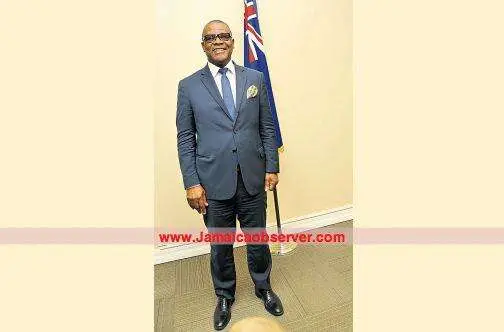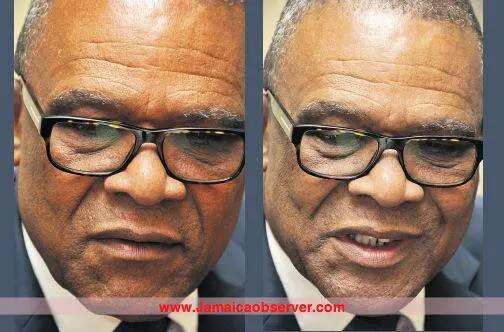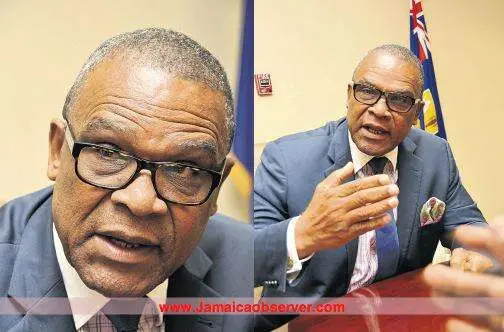
Comment taken out of context, says TCI minister
PROVIDENCIALES, TCI — Charles Washington Misick, the finance minister of the Turks and Caicos Islands (TCI) whose statement hitting foreigners celebrating their cultures in the TCI grabbed regional headlines recently, insisted he was taken out of context.
Chief minister of the TCI from 1991 to 1995, Misick whose current title is minister of finance, investment and trade, found himself at the centre of a raging controversy after his May 14, 2015 statement to the House of Assembly that critics immediately said was mainly aimed at the Haitian population in the TCI.
Drawing rapturous applause and desk-thumping from some colleague ministers in the parliament, the minister declared that foreigners who wished to celebrate their national cultures should stay home, .
“We have something coming up in a few weeks called Haitian Flag Day, we gat Jamaica Day, we gat Bahamas Day… when the hell we gonna have Turks and Caicos Day?” Misick asked.
“If you don’t want to be a part of us we cannot encourage, we can’t support them with all of these days… If you are gonna be in this country, be in this country, contribute and be a part of this country. If you want to be in Haiti and Jamaica and The Bahamas, stay there ,” he said.
Continuing, Misick said: “It is encouraged by a lot of these different groups who are in senior positions in the private sector, right, who encourage this kind of stuff. We have to send a strong message while we as a people have to make sure that we do the right thing by our country, and by the same token we have to make sure that people who come here do the right thing by our country and we should not be supporting all of these different splinter groups with their different days; you would never see me appearing to not a one of them, I would not.
“This is Turks and Caicos, if you’re here, this is Rome, do as the Romans do. If you want to be here, you contribute here, if you don’t want to be here, you want to be somewhere else then, American Airlines fly how many times a day? Alright…”
In the lead-up to the statement, Misick explained that if the TCI wanted to model the assimilation programme which was successfully established in Singapore, it must recognise that Singapore was not a democracy and that other cultural celebrations were basically abandoned to embrace the Singaporean way.
But although Misick’s broad brush touched Jamaicans and Bahamians, there were suggestions in the local media that his statement was aimed primarily at the rapidly growing Haitian population whose size is second only to native TC Islanders or Belongers as they are also called.
There were also suggestions that the finance minister might have panicked when he looked at population figures suggesting that it was a matter of time before the Haitians outnumbered native Islanders.
The TCI Sun newspaper which published Misicks’ statement cited official figures showing that in a total TCI population of 31,458, Haitians accounted for 10,981, compared with 12,030 who were citizens of the British Overseas Territory, meaning that there were only 1,049 more Belongers than Haitians.
Jamaicans came a distant third with 1,768, followed by the Dominican Republic with 1,476; the United States — 818; The Bahamas — 524; Canada — 403; the United Kingdom — 281; Guyana — 374; and 262 from other countries.
Responding to his critics, however, Misick stressed in an interview with the Jamaica Observer that he had no intention of demonising Haitians, most of whom were hard-working, law-abiding members of the TCI society. He said that the TCI had a high number of illegal aliens who were mostly from Haiti and the Dominican Republic.
But he was reacting to the single event called Haitian Flag Day and the thought that 37 per cent of the population — the proportion of Haitians there — would be massing in the streets on a Sunday to celebrate their culture, in a country where most of the people are religious and church-going.
“People who don’t have that experience would not understand it,” said Misick, asking: “What would the reaction be in Jamaica to something similar?”
He said that Jamaica did not have a situation in which a sizeable portion of the population was made up of one large group of foreigners who could assemble in the streets at one time.
Saying that the TCI was “one of the most tolerant countries when it comes to immigration”, he took a jab at Jamaica by citing a United Nations document reporting that six weeks after the devastating earthquake in Haiti, and at a time when the UN was encouraging countries not to repatriate illegal Haitians, Jamaica had sent home two groups of Haitians, “including one child born in Jamaica”.
But he made it clear he was not hitting at Jamaicans in his statement and “there is nothing wrong with Jamaicans”.
“My statement was taken out of context. I was making a statement in a local context. The story was lifted out of one context and put in another. I have nothing against Caribbean people. I am a Caribbean man. My statement was perhaps reactionary in relation to a particular event — the Haitian Flag Day where close to half of the number of foreign nationals would be assembling in the streets.
“We are a young country. A lot of the controls we don’t have as yet to ensure social cohesion and order,” said Misick. “I hoped that as a result of this we could have an honest, open conversation about a number of important social issues. This is an opportunity for us to speak to each other in the TCI.
“We must speak about a situation in which the overwhelming number of pregnancies by one single national group are flooding our hospitals. Many of the women hide from prenatal services and then showing up at the last minute to give birth, sometimes with complications. Or the schools with kids from sources (illegal aliens) that are contributing far less than they are consuming. Every country would have a problem with that,” said Misick. “It is hard to plan for people who remain off the books but need government services just the same.
“We have 57 per cent of our population who is not from here. And they are welcome to the extent that are here legally and operating within the confines of the law. But at the end of the day, the people of this island have to be in the driving seat in determining what the population of the TCI will be,” Misick said.
He noted that the expatriate community of skilled and unskilled people was important to the TCI, acknowledging: “We are never going to have enough people to run this country. I don’t expect the gap between the native population and foreigners to narrow, but it is up to the TCI as to what that make-up should be,” he added.
“Perhaps I could have been more eloquent with the statement that I made,” Misick acknowledged. “But I have no apologies to make in terms of the intention of my statement, which was that if you are going to be here and really want to be a part of the TCI, you have to show commitment to these islands.
“We can’t afford to have silo communities. There has to be commitment on both sides. There is nothing wrong with people celebrating their cultures. But they must also celebrate the TCI,” the minister told the Observer.
“If you come here to not speak English or to alienate yourself, or not support our culture, that is something I cannot support. This is the TCI and our people have a right to expect that they will have first draw on opportunities, such as jobs and government services. We were elected to protect them.”
On the plus side, Misick said the TCI economy was doing exceptionally well and they had been deemed “Best Island in the world” and “Most family friendly in the Caribbean” by TripAdvisor. the big travel website. Crime was at an extremely low rate. The investment climate was good, spurred by attractive incentives and concessions from the Government. The high-end tourists attracted by the TCI usually spent at least a week there as against a weekend.
“We want to protect that,” Misick said emphatically.



























